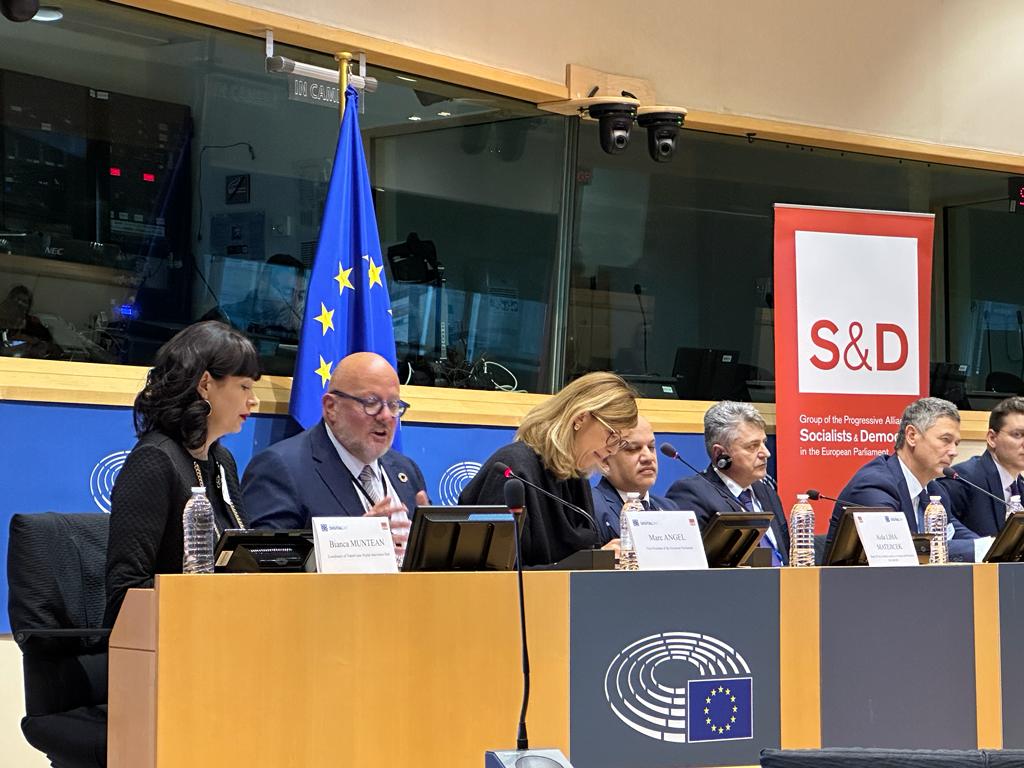
My speech at the Romanian Digital Day Event organised by MEP Victor Negrescu at the European Parliament:
Dear Minister, dear Commissioner, dear State Secretaries, dear colleagues, dear friends,
Let me first of all thank my dear colleague Victor for organising this important conference and for inviting me.
Digitalisation is a colossal transformative moment for our societies.
It has progressively become embedded in the very fabric of our societies, touching on every aspect of our lives: our economy, our work, our interpersonal relationships and our leisure time.
This naturally also generates important political challenges and questions, and some of them have already been discussed earlier today.
Digitalisation is now considered a key to national and international competitiveness and to efficiency of public services.
It also creates a new dimension regarding the convergence between and within Member States, potentially deepening existing structural polarisation and economic divides.
Indeed, the digitisation of our lives carries both opportunities and risks.
Yet, not everyone is exposed to the risks, or is able to exploit the opportunities, in the same way.
Digital infrastructure is one important aspect to this question.
Equally crucial, however, is the aspect of digital skills, of human capital, of talent, which are fundamental to economic competitiveness, but also to achieving an inclusive digital society.
A study has found that the degree of digital skills in the workforce is positively correlated to regions’ ability to specialise in new technological sectors, in particular when it comes to green technology.
Studies have also suggested that there is a strong and persistent regional polarization in the adoption and deployment of digital skills.
Therefore, one of the defining challenges will be the transmission of digital skills and the attraction and retention of digital talent in those regions that are currently struggling to reap the benefits of digitalisation.
The Commission found that 42% of European citizens, and in particular 37% of those in the workforce, lack basic digital skills, hindering digitally literate societies.
The Digital Economy and Society Index (DESI) evidences persisting gaps between Member States in terms of their digital performance, including in relation to digital skills.
Further, Eurostat has found that in 2021, just over one quarter (26%) of the EU population aged 16–74 years reported above-basic overall digital skills, with important differences between and within Member States.
Indeed, on average, people living in cities recorded a higher level at 33%, while people living in towns or suburbs at 24% and people living in rural areas at 20% displayed lower-than-average advanced digital skills.
We also know that many companies in various sectors are already struggling to fill vacancies for ICT-related jobs.
Dear all,
Challenges thus abound in relation to digital talent and skills in the regions.
In my view, it is crucial to focus on human capital: even though a region may have the necessary infrastructure or host digital companies, sustainable digitalisation ultimately comes down to people possessing the necessary skills.
Boosting skills and talent requires education and training systems that adequately prepare the younger and current generations to the new reality of our digital economy and society and support lifelong learning to continuously re-skill and upskill the workforce.
In view of the already existing imbalances, it is crucial to ensure that these policies permeate the EU.
No Member State and no region must be left behind.
It can only succeed if the full range of actors at all levels- EU, national, regional and local- commit to come together to meet this monumental task.
As the European Parliament, we already stated in a 2018 resolution on education in the digital era that the acquisition of digital skills requires a coherent, lifelong learning approach spanning formal, non-formal and informal education, and that bridging the digital divide requires a joint policy response.
At the EU level, we have a solid framework for digital policy and for boosting digital skills.
This now needs to be further filled with life in the next years.
The 2020s have been aptly proclaimed the digital decade to serve as a framework to guide our actions related to everything digital.
2023 has been proclaimed the European Year of skills.
It is very timely as millions of people need to change or improve their skills in view of the economic transformations affecting our labour market.
The “Path to the Digital Decade” plan foresees that by 2030, at least 80% of the population aged 16-74 has at least basic digital skills.
The Digital Europe Programme under the MFF earmarks €700 million to support advanced digital skills through training courses and on-the-job traineeships.
Under the RRF, each Member State must dedicate at least 20% of its recovery and resilience plan’s total allocation to measures contributing to the digital transition or to addressing the challenges resulting from it, including human capital.
Other initiatives: European skills agenda, Digital skills and jobs platform
Dear all,
It is crucial to promote and retain local talent in regions, which will involve partnerships between authorities, companies and educational institutions.
A skilled workforce without a local market in need of the talent can lead to brain drain.
It is therefore crucial to take a holistic approach to address the issue.
Let me briefly mention the exhibition ‘Innovative Romania’, which displays the latest cutting-edge technologies and innovations made in Romania.
It is a good example illustrating the challenges, efforts and successes of Romania and stands as a testament to navigating the complex landscape of digitalisation.
I would also finally like to mention the importance of cross-border cooperation to address these challenges.
In my own Member State, Luxembourg’s Digital Innovation Hub has entered into collaboration with digital innovation hubs from the Greater Region (Belgium, Germany and France) to build a common ecosystem dedicated to the digitisation of economies and skills development.
I am looking forward to hearing different perspective to this multi-layered question.
Thank you.






